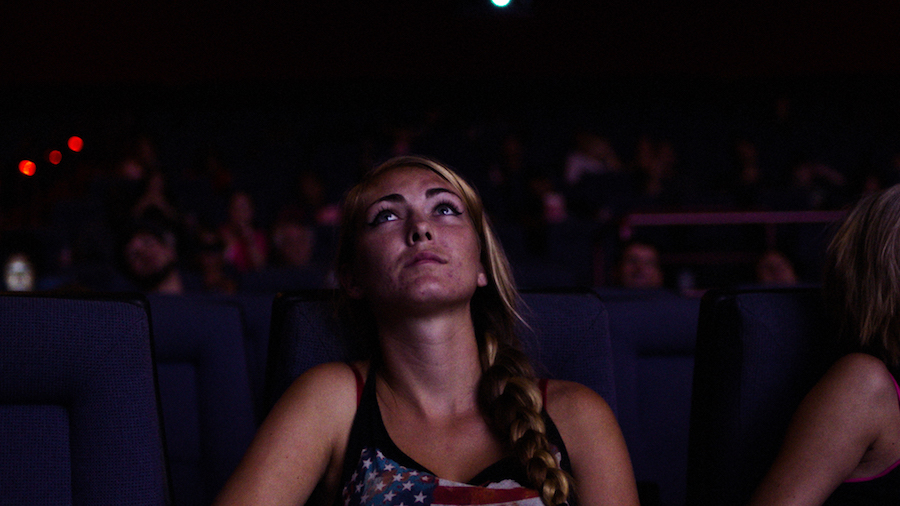‘Dark Night’ In “Dark Night,” America is a ticking time bomb. Any of its six strangers, doing not very much on a Sarasota, Fl. summer day, could blow at any moment. One of them, perhaps, is involved in the movie theater shooting that will close the film (though never be shown). A kind of art film thriller that’s decidedly more art film, it’s inspired by (though is not a recreation of) the 2012 Aurora, Co. massacre during a viewing of “The Dark Knight Rises,” which left 12 dead and 70 injured. It looks back, but it also looks forward, maybe to a time that already passed since it was made. It doesn’t explain the killer’s motives; it’s more interested in diagnosing a country. What it finds are denizens who are easily bored, easily wooed by impossible dreams; their access to much-needed health care has nothing on their access to guns. We’re a nation held together by scotch tape and bubble gum, and maybe one day we’ll destroy ourselves from within. That makes “Dark Night” sound like an issue film, a think piece in movie form, a “movie of the moment.” That it’s none of these things is a small miracle. It’s a languorous dream that might be a nightmare, slow and soothing but always on edge. After a cryptic opening post-shooting, “Dark Night” jumps back, hopscotching between people who were victims, survivors or even the perpetrator. They’re not doing much, and the camera just observes private moments. We see an angsty high schooler with a shaved head, who’s reached the point where he’s seen the American dream is a lie. There’s a tense vet who only finds calm in cleaning his guns. And there’s a young man bummed over an unrequited love. He, too, has some guns. One of these could be our suspect; maybe, on another day, any of them could have snapped. The obvious comparison is Gus Van Sant’s “Elephant,” about Columbine, though director Tim Sutton also ropes in bits of Larry Clark (hanging reprobate youths), Matthew Porterfield’s “Putty Hill” (doc elements slipped into loose fictions), even Michael Haneke’s “71 Fragments of a Chronology of Chance,” which also observed an ensemble, one of whom would ultimately break out firearms. Sutton has his own voice, too. Previously, the filmmaker has journeyed to far-flung parts of the country, spending time with Arizona teens in “Pavilion” or trailing an enigmatic musician in “Memphis.” His films absorb places and people, creating something out of what’s already there. RELATED: Interview: Raoul Peck on “I Am Not Your Negro” and why we need James Baldwin Much of “Dark Night” is the same-old Sutton; enter late and without knowledge of its sellable hook, and you might think it a simple, deep stewing in the Florida suburbs. You’d still suspect something’s off. Everyone’s vaguely discontented, and the tone is vaguely haunted. Every now and then the ambiance is interrupted by the songs of Maica Armata, which smack of a stripped-down Mazzy Starr — a single guitar and vocals, or sometimes just vocals. (The opening, over black, with just her voice, is incantatory — like a blessing before the picture starts.) The lyrics are rarely discernible, but when they are they speak of dark omens: “Just another nightmare, waiting for the right night.” “Dark Night” casts a spell, but it is occasionally broken. Rigorously as Sutton erases any message-mongering, sometimes you can see the seams. Traces of cheap motivations or preachy commentary sneak in now and then, poisoning the air of ambiguity. He can’t help throw in a cheap part where we hear screaming off-screen; we think it’s some atrocity, only to learn it’s just some girls joking around. Sutton’s images may beam empathy, but not with a woman who exercises herself to death. As she barks personal trainer taunts to herself (“Do you feel like you’re dying? That’s the right feeling!”) and takes selfies for no one, you can sense scorn, disdain for a narcissistic culture — the very think piece fodder he otherwise avoids. You could even make the case that what Sutton’s doing all around is suspect — that while observing what looks like offhand behavior, he’s really reducing his characters to types, to people who could resort to violence. You could also make the case that he’s granting true humanity to people who themselves worry that they’re types, that inside them lurks a murderer waiting to get out. Sutton doesn’t show the shooting, but it’s more than respectful art film elision. It’s allowing everyone to be human, mysterious, unknowable and worthy of the step that comes after empathy: conversation.
Director: Tim Sutton
Stars: Robert Jumper, Anna Rose Hopkins
Rating: NR
4 (out of 5) Globes
‘Dark Night’ is a haunting look at violence and boredom in America

Cinelicious
Follow Matt Prigge on Twitter @mattprigge

















